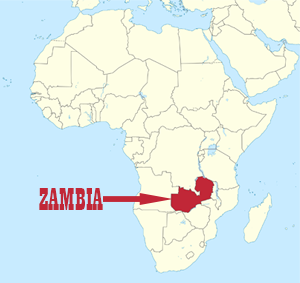 In
Zambia, the Southern
Africa Federation of the Disabled (SAFOD) works with its national
affiliate, the Zambia
Federation of Disability Organisations (ZAFOD). ZAFOD is a legally
constituted national umbrella organization for disability organizations
in Zambia and has a long history of work in the legal reform and human
rights sector.
In
Zambia, the Southern
Africa Federation of the Disabled (SAFOD) works with its national
affiliate, the Zambia
Federation of Disability Organisations (ZAFOD). ZAFOD is a legally
constituted national umbrella organization for disability organizations
in Zambia and has a long history of work in the legal reform and human
rights sector.
With a membership of 12 organisations, the primary goal of the
organisation is to advocate for the promotion and protection of the
rights of persons with disabilities.
Zambia signed the
United Nations Convention on the Rights of Persons
with Disabilities (UNCRPD) on 9 May 2008 and ratified it on 1 February
2010.
Based on data from the
2010 Census of Population and Housing, the
total population of Zambia, at 13,046,508. The World Health Organization
(WHO) estimates that 2 million women and men in Zambia, or 15 per cent
of the population have a disability. Furthermore, a higher percentage of
persons living with disabilities include persons with hearing and visual
disabilities and most of these live in rural areas where access to basic
services is limited.
The most prevalent forms of disability in Zambia include:
- Visual impairment;
- Hearing impairment;
- Physical impairment;
- Communication impairment; and
- Intellectual impairment.
With regards to the situation of assistive technology, it is
pertinent to state that that ZAFOD is one of the SAFOD's ten national
affiliates that have been actively involved in the Assistive
Technology Information Mapping Project (AT-Info-Map), a project of
SAFOD,
AfriNEAD,
University of Washington, and
Dimagi which
started in March 2016. Part of the project has been to raise awareness
of the AT in the ten countries where SAFOD works, and the activities has
involved understanding the situation of AT in Zambia as follows:
- Disabled Peoples Organizations (DPOs)
affiliated to ZAFOD procure AT from local suppliers such as
Beitcure, Apters, ZNAHI, University Teaching Hospital (Orthopaedics
and Eye clinic), Disacare, Lumina Hear and Care, Italian Hospital,
Library for the blind. Some are procured abroad and some from
Donations both local and international.
- DPOs do not have the expertise to repair
broken IT and refer to AT specialists
- The policy environment for AT policies, is not
conducive as Zambia has no policy on assistive technology although
other related tom for example, disability directly impact the
assistive technology sector.
- The Supply Chain is not very reliable as the
suppliers do not have the AT readily available at all times and
orders have to be made hence deliveries take very long. Some of the
AT is imported from overseas.
- Most ATs in Zambia are small and medium scale.
There are not many big ones. The small and medium suppliers do not
have all the types of AT that are needed by Persons of different
Disability categories.
- DPOs face the following barriers; supply chain
and cost related barriers – The AT is too expensive for most persons
with disabilities.
- Policies need to change or be developed with
regards to AT, Supply Chain needs to improve and Social attitudes,
all major hospitals need to stock assistive technologies.
- Priority area of interventions by DPOs: The
Disability Policy indicates that government will establish two
facilities to produce assistive devices. This is yet to be
implemented though.Need more Interventions
The following are some of the recommendations from various
stakeholders to address the challenges associated with assistive
technology in Zambia:
- Training of Technicians to produce more Aids
locally
- Capacity Building of Government line
ministries in the provision of AT
- Lobbying for duty free AT for imported ones
- Lobbying for affordable and reliable AT
- AT to be made available in all districts, not only in Lusaka the capital city
- Training of local DPOs in the production of quality AT/assembling AT.
